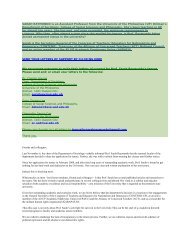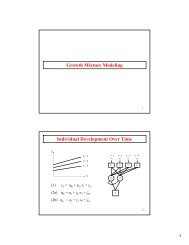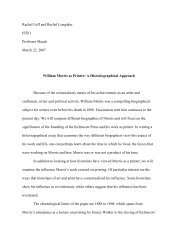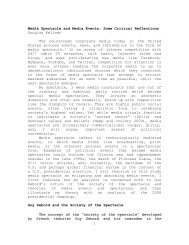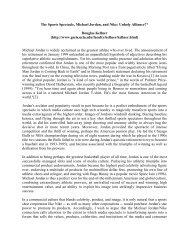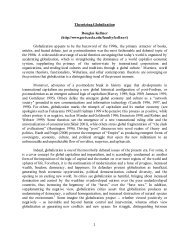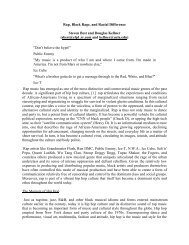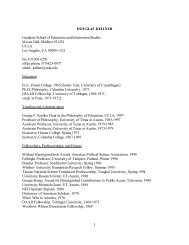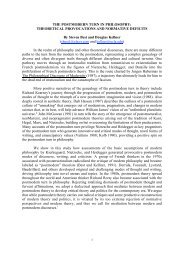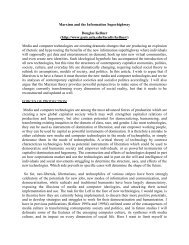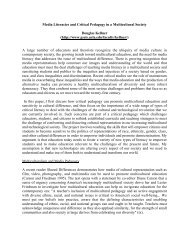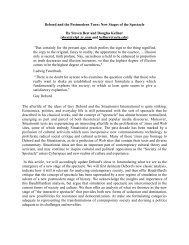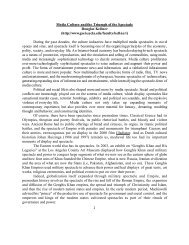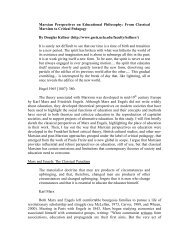Globalization and the Postmodern Turn By Douglas Kellner ... - UCLA
Globalization and the Postmodern Turn By Douglas Kellner ... - UCLA
Globalization and the Postmodern Turn By Douglas Kellner ... - UCLA
You also want an ePaper? Increase the reach of your titles
YUMPU automatically turns print PDFs into web optimized ePapers that Google loves.
In sum <strong>and</strong> to conclude: historical epochs do not rise <strong>and</strong> fall in neat patterns or at precise<br />
chronological moments. Perhaps our current situation is parallel in some ways to <strong>the</strong><br />
Renaissance, which constituted a long period of transition between <strong>the</strong> end of premodern<br />
societies <strong>and</strong> <strong>the</strong> emergence of modern ones. Such periods are characterized by unevenly<br />
developing multiple levels of change, <strong>and</strong> <strong>the</strong> birthpangs associated with <strong>the</strong> eruption of a new<br />
era. In fact, change between one era <strong>and</strong> ano<strong>the</strong>r is always protracted, contradictory, <strong>and</strong> usually<br />
painful. But <strong>the</strong> vivid sense of "betweenness," or transition, requires that one grasp <strong>the</strong><br />
connections with <strong>the</strong> past as well as <strong>the</strong> novelties of <strong>the</strong> present <strong>and</strong> future. Thus, it is important<br />
to capture both <strong>the</strong> continuities <strong>and</strong> discontinuities of <strong>the</strong> postmodern with <strong>the</strong> modern, in order<br />
to make sense of our current predicament.<br />
Living in a borderl<strong>and</strong> between <strong>the</strong> modern <strong>and</strong> postmodern creates tension, insecurity,<br />
confusion, <strong>and</strong> even panic, as well as excitement <strong>and</strong> exhilaration, thus producing a cultural <strong>and</strong><br />
social environment of shifting moods <strong>and</strong> an open but troubling future. The concept of a<br />
postmodern turn is aware of <strong>the</strong> risks <strong>and</strong> dangers in <strong>the</strong> current social constellation, as well as<br />
<strong>the</strong> hope of new possibilities <strong>and</strong> excitement. The postmodern turn is thus deeply implicated in<br />
<strong>the</strong> moods <strong>and</strong> experiences of <strong>the</strong> present <strong>and</strong> is an important component of our contemporary<br />
situation (Best <strong>and</strong> <strong>Kellner</strong> 1997). The very ubiquity of <strong>the</strong> discourse of <strong>the</strong> "postmodern," its<br />
constant proliferation, its refusal to fade away, <strong>and</strong> its seeming longevity -- several decades is a<br />
long time for a mere "fad" in our rapidly changing world -- suggest that it is addressing current<br />
concerns in a useful way, that it illuminates salient present-day realities, that it resonates with<br />
shared experience, <strong>and</strong> that it is simply an ingrained part of <strong>the</strong> current critical lexicon that one<br />
has to come to terms with, one way or ano<strong>the</strong>r.<br />
Notes<br />
Attempts to chart <strong>the</strong> globalization of capital, decline of <strong>the</strong> nation-state, <strong>and</strong> rise of a new<br />
global culture include <strong>the</strong> essays in Fea<strong>the</strong>rstone 1990; Giddens 1990; Robertson 1991; King<br />
1991; Bird, et al, 1993; Gilroy 1993; Arrighi 1994; Lash <strong>and</strong> Urry 1994; Grewel <strong>and</strong> Kaplan<br />
1994; Wark 1994; Fea<strong>the</strong>rstone <strong>and</strong> Lash 1995; Axford 1995; Held 1995; Waters 1995; Hirst <strong>and</strong><br />
Thompson 1996; Wilson <strong>and</strong> Dissayanake 1996; Albrow 1996; <strong>and</strong> Cvetkovich <strong>and</strong> <strong>Kellner</strong><br />
1997. I will draw on <strong>the</strong>se <strong>and</strong> o<strong>the</strong>r studies during <strong>the</strong> course of this article. Yet I am especially<br />
indebted to work with Ann Cvetkovich on a book Articulating <strong>the</strong> Global <strong>and</strong> <strong>the</strong> Local.<br />
<strong>Globalization</strong> <strong>and</strong> Cultural Studies (1997) <strong>and</strong> to work with Steven Best on The <strong>Postmodern</strong><br />
<strong>Turn</strong> (1997).<br />
. A web site search on globalization that I did over several weeks in early 1997 indicated that <strong>the</strong><br />
concept of globalization turned up in most major corporate web sites, as well as many state <strong>and</strong><br />
local governmental sites, political action group <strong>and</strong> social movement sites, <strong>and</strong> a plethora of<br />
academic sites, with many of <strong>the</strong> latter indicating globalization research projects, suggesting that<br />
<strong>the</strong> concept provides cultural capital <strong>and</strong> economic awards for academics as well as business.<br />
. On postmodern <strong>the</strong>ory, see <strong>Kellner</strong> <strong>and</strong> Best 1991 <strong>and</strong> on <strong>the</strong> postmodern turn, see <strong>Kellner</strong> <strong>and</strong><br />
Best 1997.<br />
. See Polyani (1957: 189) on how market liberals failed to see <strong>the</strong> importance of <strong>the</strong> nation state



